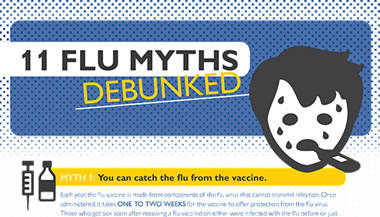Flu: Answers from Physician Michael Albert
Featured Expert:
Each year, between 5 to 20 percent of Americans get the flu, sending many to the hospital with severe complications. Learn how you and your loved ones can stay healthy with information from internal medicine physician Michael Albert.
How can I prevent the flu?
- Get a flu shot. The flu vaccine is the best way to prevent the virus.
- Limit contact with infected people.
- Wash your hands frequently.
- Avoiding touching your mouth, eyes and nose.
- To stop the virus from spreading, stay at home if you’re sick, and encourage others to do the same. Don’t return to work or school until you’ve been fever-free, without medication, for at least 24 hours.
Is it too late to get my flu shot?
The vaccine takes around two weeks to become effective, so waiting until flu season has already begun leaves you vulnerable to the virus. You’re better late than never, though. Even toward the end of winter, you can still benefit from the shot — especially if the flu season lasts longer than usual.
The vaccine is typically available by September or October, and you should try to get your flu shot as early as possible. Talk to your doctor or pharmacist to find locations near you.
What’s the difference between the flu and the common cold?
The common cold and the flu are caused by different viruses.
Patients with the flu often have a high fever, headache, extreme fatigue, and severe aches and pains. Those symptoms aren’t usually seen in those who have the common cold.
The flu is far more severe. Colds usually clear up on their own after a few days, but the flu can progress to pneumonia or even death.
Can antiviral drugs prevent the flu?
Antiviral drugs are typically used to help sick people recover faster, but your doctor may prescribe them to prevent the flu in some cases —especially if you are at higher risk of complications and in close contact with people who have the flu.
The flu vaccine is still your best bet of warding off the virus, though.
If you think you have the flu or are in close contact with someone already infected, talk to your doctor to see if you should take antiviral drugs. Taking them within two days of getting sick can help you get back on your feet sooner and avoid potentially deadly complications.
Should I be concerned about bird flu?
No. Small outbreaks of bird flu aren’t uncommon, but there’s no need to take chicken off the menu just yet. Transmission from birds to humans is rare and typically occurs in those who handle live birds or their droppings. To date, no one has been infected by any bird flu virus from eating properly cooked poultry.





